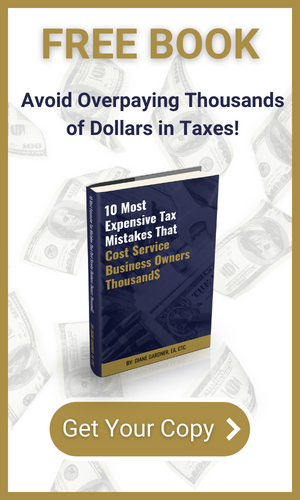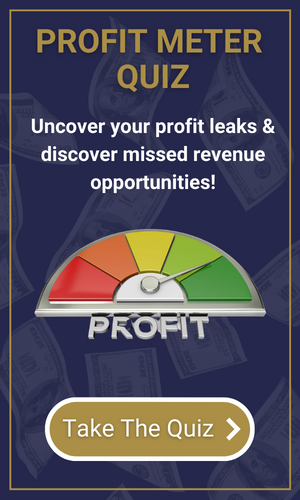When you’re just starting up your business, you’re probably thinking about your services, how you’re going to market them, what kinds of customers you want to serve, what equipment you’ll need, software, tools, and a million other things.
You’re probably not spending too much time thinking about what kind of business entity you need to set up.
And that’s okay… in the beginning.
When you’re just getting started it makes sense to just roll up a proprietorship, partnership, or LLC and just start getting your hands dirty.
But if you don’t revisit that decision once you get the business off the ground, you are almost certainly leaving thousands of dollars of tax savings on the table every year!
Let’s do a quick run-through of the different types of business entities you can form and then we’re going to talk about my favorite strategy for service business owners right now.

The Five Ways You Can Structure Your Business
#1 Sole Proprietorship
This one is the simplest. You own and operate the business by yourself and you report income and expenses on your own personal tax return. This is where most startups and small businesses with no employees start.
#2 General Partnership
Similar to a Sole Proprietorship. A partnership has two or more general or limited partners. General partner distributions are taxed as ordinary income and subject to self-employment tax. Limited partner distributions are taxed as passive income.
#3 S Corporation
An S corporation is a corporation that elects not to pay tax itself. Instead, it files an informational return and passes income and losses through to shareholders according to their ownership. Your salary is subject to income tax and employment tax (Social Security and Medicare); pass-through profits are subject to ordinary income but not employment tax. Hint: this distinction is going to matter to you very soon.
#4 C Corporation
A C Corporation is considered a separate legal person under the law and your liability is generally limited by your investment in the company. It files its own return, pays its own taxes, and chooses whether or not to distribute dividends to shareholders. This kind of business entity has a lot of benefits who want to reduce their liability, but it also has the highest regulatory cost and is the most complex.
#5 Limited Liability Corporation (LLC)
LLCs offer the strongest asset protection of any entity but are not considered distinct entities under the law. Single-member LLCs are taxed as proprietors, unless you elect to be taxed as a corporation. Multi-member LLCs choose to be taxed as partnerships or corporations. This flexibility makes LLCs the entity of choice for many startup businesses.
There is more to business entities than all that, but the key point is that if you are operating as a sole proprietorship, partnership, or LLC, you may pay as much in self-employment tax as you do in income tax.
This leads us to my favorite business entity for service business owners: the S Corporation.
Let’s walk through a quick scenario to see how you could be saving thousands of dollars in taxes right now.
S Corp vs. Sole Proprietorship
Let’s say your S corporation earns $80,000 and let’s compare that to a sole proprietorship making the same.
If you pay yourself $40,000 in wages with an S Corp, you’ll pay about $6,120 in Social Security.
With a sole proprietorship, you’ll pay regular tax at your regular rate, whatever that is and you’ll also pay about $11,000 in self-employment tax.
That self-employment tax replaces the Social Security and Medicare tax that your employer would pay and withhold if you weren’t self-employed.
If you’re like most readers, you’re not planning to retire on Social Security. Heck, you’d be delighted if it’s all still there! But you’re not actually counting on it in any meaningful way.
With an S Corp, you’ll avoid employment tax on the income distribution. And that saves you $5,184 in self-employment tax you would have paid without the S-corporation.
You simply pay less tax with an S Corp.
This is great because it’s not like tying up money in equipment to get a deduction or putting money into a retirement account. It’s just a straight-up tax saving that you can take advantage of right away.
One thing to note with the S Corp is that you do have to pay yourself a reasonable wage, whatever you would pay an employee to do the same work.
If you stretch believability here the IRS may assess all the income as wages and hit you with hefty penalties at the same time.
Don’t get greedy and you’ll be fine.
So you can see, there’s a real possibility for saving tremendous amounts of money on your taxes, just by setting up your business as the right entity.
If you would like some help navigating those waters and want to find out how much you can save, click here to schedule a call with us and we’ll walk you through the process!





